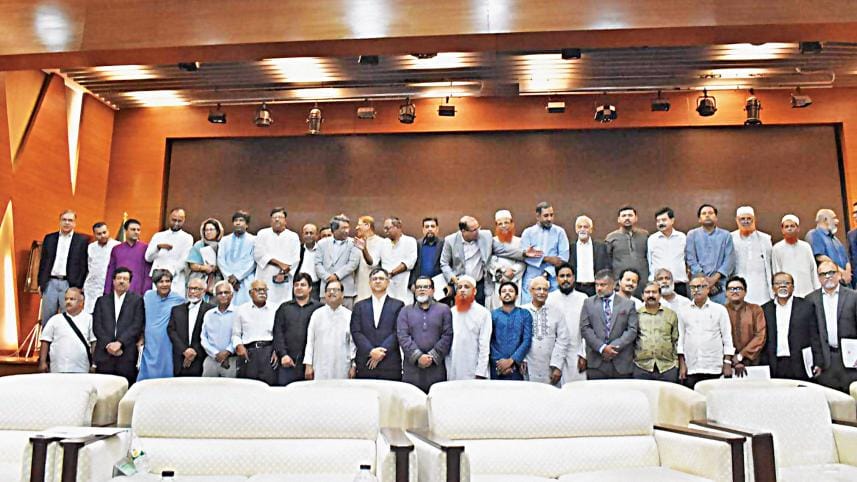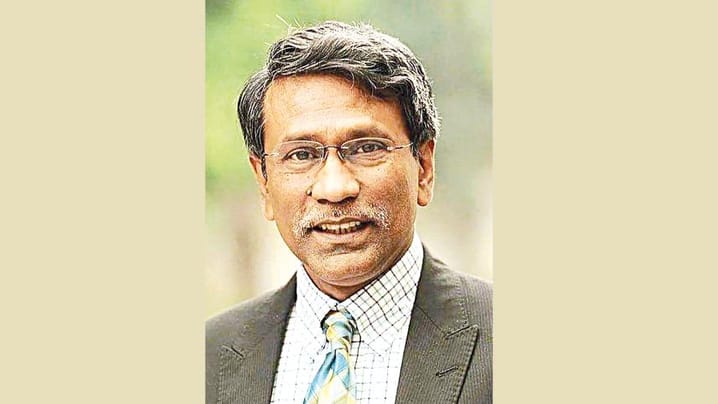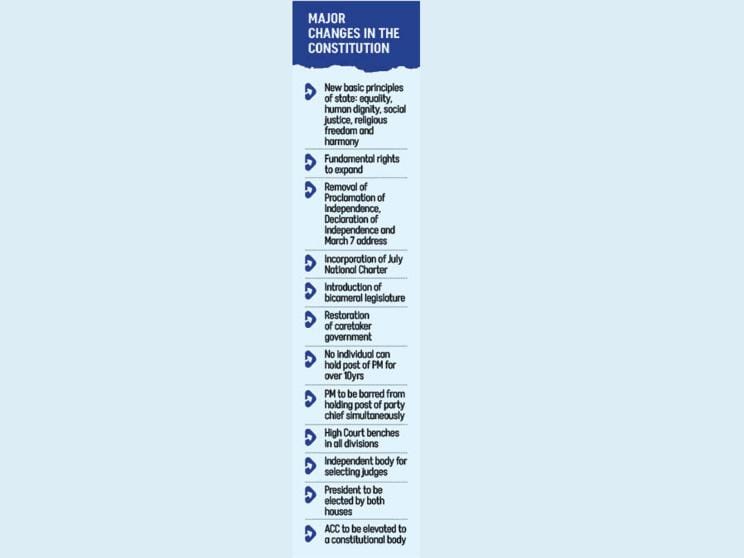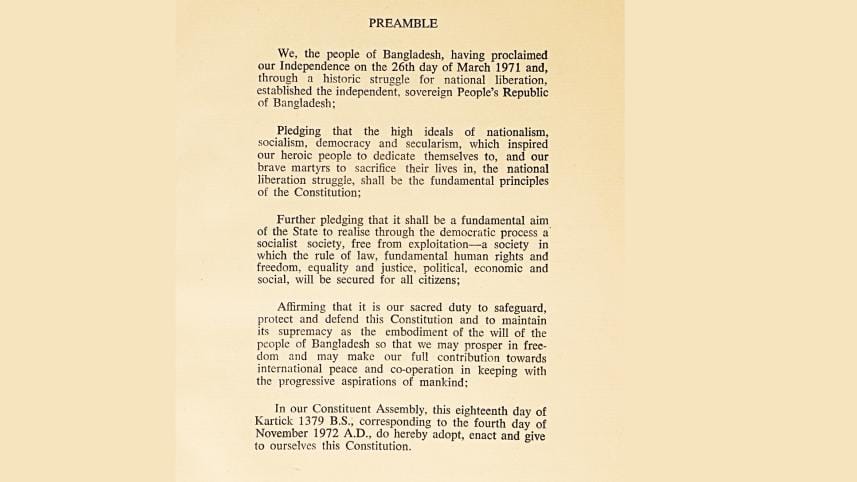Groundwork laid for sweeping constitutional reforms

The July National Charter, forged in the wake of the 2024 mass uprising, seeks to reshape Bangladesh's constitution, as it proposes extensive reforms aimed at strengthening democracy and accountability.
Over three dozen articles of the constitution need to be amended, with changes to scores of provisions and the inclusion of several new ones. Moreover, at least three Articles will be repealed, says the charter that contains 84 reform proposals.
Finalised through discussions between 30 political parties, the charter outlines changes that will affect the basic principles, institutional structures, and the rights of citizens.
Political parties have pledged to incorporate this ambitious blueprint into the schedule of the constitution and ensure its protection. They have also committed to providing constitutional recognition to the historic significance of the uprising.
Ali Riaz, vice president of the National Consensus Commission, said the aim of this constitutional overhaul is to make the state more accountable.
"We want to prevent any system that allows the concentration of power. We want citizens' rights to be protected and institutions to be strong and independent."

"We want to prevent any system that allows concentration of power. We want citizens' rights to be protected and institutions to be strong and independent."
REPEAL OF ARTICLES
The current constitution comprises 153 articles, a preamble, and several schedules that outline territorial boundaries, oaths, and electoral procedures.
Political parties have agreed to repeal articles 7A, 7B, and the fifth, sixth, and seventh schedules that were incorporated into the constitution through article 150(2).
Article 7A says a person shall be guilty of sedition for abrogating, repealing, or suspending the constitution or any of its provisions by unconstitutional means.
Article 7B renders almost a third of the constitution unamendable, including the preamble; parts I and II that deal with the republic and fundamental principles of state policy; part III, which covers fundamental rights; provisions concerning the basic structure of the constitution; and article 150.
Article 150(2) provides for the inclusion of Bangabandhu Sheikh Mujibur Rahman's historic March-7 speech in the fifth schedule; the telegram of the Declaration of Independence issued by him on March 26, 1971, in the sixth schedule; and the Proclamation of Independence of the Mujibnagar Government on April 10, 1971, in the seventh schedule.

INCLUSION
The fundamental principles of state policy will include "equality, human dignity, social justice, and religious freedom and harmony".
About the new principles, Ali Riaz said, "These will be part of the constitution as core values, which could either be included or replace the old ones."
The constitution now upholds four fundamental principles: nationalism, socialism, democracy, and secularism.
A new provision will recognise Bangladesh as a nation of multiple ethnicities, religions, languages, and cultures.
"This will ensure the coexistence and proper dignity of all communities, aiming to foster greater inclusivity and uphold minority rights," Ali Riaz said.
The charter proposes expanding fundamental rights, ensuring their constitutional and legal protection as well as their effective implementation. The consensus commission's report will outline recommendations for future legislative action.
New provisions need to be incorporated into the constitution to reintroduce the caretaker government system and give full independence to the judiciary.
Another provision will introduce bicameral legislature, comprising a 300-member lower house (Jatiya Sangsad) and a 100-member upper house.
Even during a state of emergency, the citizens' right to trial under article 35 will be ensured through the inclusion of a provision in article 47A.
Additional provisions will allow impeachment of the president for treason, gross misconduct, or a constitutional violation, subject to a two-thirds majority in both lower and upper houses after a formal hearing.

AMENDMENTS
Article 3 will be revised to reaffirm Bengali as the "state language", and recognise other tongues spoken across Bangladesh as "national languages".
Article 6(2) will be amended to do away with the distinction between Bengalee, the nation; and Bangladeshi, the citizenry. All citizens of Bangladesh will be identified as Bangladeshis.
There will be tougher requirements for constitutional amendments, which can currently be made with a two-thirds majority in parliament. But the charter says such amendments will require a two-thirds majority in the lower house and a majority in the upper house, and in some cases, a referendum as well.
A referendum will be needed to amend articles that cover fundamental principles, and provisions regarding the president, the cabinet, the caretaker government system and the amendment procedure.
Ali Riaz said this provision is meant to safeguard core structural characteristics from easy alteration.
The charter proposes amending Article 20(2) to affirm that the state shall create conditions wherein, as a general principle, no person shall be able to "abuse constitutional or legal powers" for personal gains.
An amendment will be made to article 141A to redefine the grounds for declaring a state of emergency, replacing "internal disturbance" with "a threat to independence, sovereignty, territorial integrity, war or natural disaster".
The declaration of emergency will require the cabinet's approval alongside the prime minister's signature on the relevant documents. The leader of the opposition or a nominated representative must be present at the cabinet meeting when such a decision is made.

The president will be chosen by a majority vote in both houses of the legislature. No candidate will be allowed to hold a position in the state, the government, a political party or an organisation at the time of candidacy.
Article 48(3) will be altered to expand the president's powers, granting unilateral authority to appoint heads and members of the National Human Rights Commission, Information Commission, Press Council, Law Commission, Energy Regulatory Commission and the governor of Bangladesh Bank.
Further amendments will be made to empower the president to appoint and remove judges in the Supreme Court without requiring the PM's advice.
The president will retain the power to grant clemency, subject to the consent of victims or their families. The exercise must be in line with the defined legal criteria, policies, and procedures.
There will be two new provisions: one to bar any individual from serving as prime minister for more than 10 years, regardless of the number of terms, and another to prevent the PM from holding the position of party chief simultaneously.
Both houses of parliament will have one deputy speaker nominated from the opposition. Chairpersons of key parliamentary standing committees as well as departmental committees will also be elected from the opposition.
Article 70 will be amended to allow lawmakers to vote freely except for finance bills and votes of confidence.
Changes will be made to a provision to give the chief justice the authority to set up permanent benches in each administrative division.
A new provision will allow the establishment of an independent judicial appointment commission to oversee the selection process for judges of the apex court.
Several provisions need to be altered to clearly outline the appointment procedure for key oversight institutions, including the Election Commission (EC), the Ombudsman, the Public Service Commission, the Office of the Comptroller and Auditor General, and the Anti-Corruption Commission. Furthermore, the anti-graft watchdog will be elevated to a constitutional body.
Additional provisions will ensure that local government elections are held under the EC's direct supervision. Local bodies will be granted full autonomy regarding financial management and implementation of development projects unless they fall under national programmes.
"We have tried to ensure that there is no constitutional scope for authoritarianism… But it's not just about writing it down, it is a matter of implementation, and for that, political culture must change," said Ali Riaz.
About the implementation process, he said, "I won't comment on that right now. A discussion is still going on, and anything I say might be misinterpreted."




 For all latest news, follow The Daily Star's Google News channel.
For all latest news, follow The Daily Star's Google News channel.
Comments